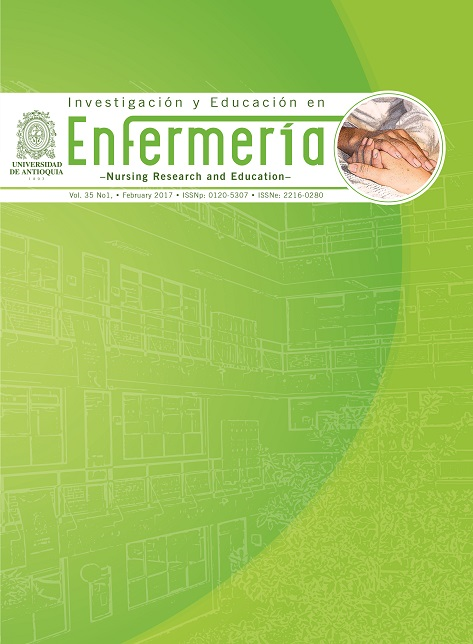Menopause, the beginning of aging for Chilean women: A qualitative study
DOI:
https://doi.org/10.17533/udea.iee.v35n1aKeywords:
Aging, female, menopause, qualitative research.Abstract
Objective. To develop the meaning of menopause of a group of post-menopausal women and their relationship with aging.
Methods. Qualitative descriptive study on 15 Chilean women that completed a taped face-to-face in depth interview that were interpreted according to Krippendorff.
Results. A qualitative content analysis revealed the presence of two themes: (a) Cessation of women´s reproductive stage and (b) a life transition to aging.
Conclusion. Women perceived their menopause as the beginning of aging focusing on the end of fertility and the social connotation that this new role implies. Feeling old 10 years before the customary beginning of old age is an important starting point to be incorporated in women’s health education.
How to cite this article: Araya AX, Urrutia MT, Dois A. Menopause, the beginning of aging for Chilean women: A qualitative study. Invest. Educ. Enferm. 2017; 34(1):
Downloads
References
(1) Instituto Nacional de Estadísticas- Demográficas y vitales [Internet]. 2013. Chile: INE; (Cited 30 may 2016). Available from: http://www.ine.cl/canales/chile_estadistico/familias/demograficas_vitales.php.
(2) World Health Organization (WHO). Envejecimiento activo: un marco político. Rev. Esp. Geriatr. Gerontol. 2012; 37(S2):74-105.
(3) Rich J, Wright S, Loxton D. “Patience, hormone replacement therapy and rain!” Women, ageing and drought in Australia: Narratives from the midage cohort of the Australian longitudinal study on women’s health. Aust. J. Rural Health. 2012; 20(6):324-8.
(4) Wong LP, Awang H, Jani B. Midlife crisis perceptions, experiences, help seeking, and needs among multiethnic Malaysian women. Women Health. 2012; 52(8):804-19.
(5) Stepaniak U, Szafraniec K, Kubinova R, Malyutina S, Peasey A, Pikhart H, et al. Age at natural menopause in three central and eastern European urban populations: the HAPIEE study. Maturitas. 2013; 75(1):87-93.
(6) Guthrie J, Dennerstein L, Taffe JR, Lehert P, Lehert BH. Hot flushes during the menopause transition: a longitudinal study in Australian-born women. Menopause. 2005; 12(4):460–7.
(7) Im E, Ko Y, Hwang H, Chee W. Symptom-specific or holistic: Menopausal symptom management. Health Care Women Int. 2013; 33(6): 575-92.
(8) Ministerio de Salud de Chile. Orientaciones técnicas para la atención integral de la mujer en edad de climaterio. MINSAL; 2013 [cited 30 may 2016]. Available from: http://web.minsal.cl/portal/url/item/dab6d09c5a3852eae04001016401264a.pdf
(9) Sandelowski M. Focus on research methods. Whatever happened to qualitative description? Res. Nurs. Health. 2000; 23(4):334–40.
(10) Krippendorff K. Content analysis: An introduction to its methodology. Thousands Oaks: Sage Publications; 2004.
(11) Sandelowski, M. Using qualitative research. Qual. Health Res. 2004; 14 (10): 1366–86.
(12) Lincoln YS, Guba EG. Naturalistic Inquiry. Thousands Oaks: Sage Publications; 1985.
(13) Hvas L. Menopausal women’s positive experience of growing older. Maturitas. 2006; 54(3): 245-51.
(14) Dare J. Transitions in midlife women’s lives: contemporary experiences. Health Care Women Int. 2001; 32(2): 111-33.
(15) Mahadeen AI, Halabi JO, Callister, LC. Menopause: a qualitative study of Jordanian women’s perceptions. Int. Nurs. Rev. 2008; 55(4):427-33.
(16) Ballard K, Elston MA, Gabe J. Private and public ageing in the UK: the transition through the menopause. Curr. Sociol. 2009; 57(29):269-90.
(17) Im EO, Lim HJ, Lee SH, Dormire S, Chee W, Kresta K. Menopausal Symptom Experience of Hispanic Midlife Women in the United States. Health Care Women Int. 2009; 30(10); 919-34.
(18) Pimenta F, Lea l, Maroco J, Ramos C. Representations and perceived consequences of menopaused by pre- and post-menopausal Portuguese women: a qualitative research. Health Care Women Int. 2011; 32(12):1111-25.
(19) Herzig L. Woman’s Voice as her life changes. World Futures. 2012; 68 (7):518-34.
(20) Rubinstein H, Foster J. ‘I don’t know whether it is to do with age or to do with a stage in your life’: Making sense of menopause and the body. J. Health Psychol. 2012; 18(2): 292-307.
(21) Ferreira VN, Chinelato RSC, Castro MR, Ferreira MEC. Menopause: biopsychossocial landmark of female aging. Psicol. Soc. 2013; 25(2):410-9.
(22) Mackey S, Teo SS, Dramusic V, Lee HK, Bougthon M. Knowledge, Attitudes, and Practices Associated With Menopause: A Multiethnic, Qualitative Study in Singapore. Health Care Women Int. 2015; 35(5):512-28.
(23) Lind-Astrand L, Hoffman M, Hammar M, Kjellgreen K. Women’s conception of the menopausal transition-a qualitative study. J. Clin. Nurs. 2007; 16(3):509-17.
(24) Im EO, Lee H, Chee W. Black women in menopausal transition. J. Obstet. Gynecol Neonatal Nurs. 2010; 39(4):435-43.
(25) Jurgenson JR, Jones EK, Haynes E, Green C, Thompson SC. Exploring Australian Aboriginal Women’s experiences of menopause: a descriptive study. BMC Womens Health. 2014; 20;14(1):47.
(26) Prior, R. & Pina, F. El logro de la Madurez Femenina: la experiencia del climaterio en un grupo de mujeres. Enferm. Glob. 2011: 10(3):330-45.
(27) Saka MJ, Saidu R, Jimoh A, Akande A, Olatinwo AW. Behavioral pattern of menopausal Nigeria women. Ann. Trop. Med. PH. 2012; 5(2): 74-9.
(28) Ringa V, Diter K, Laborde C, Bajos N. Women’s sexuality: from aging to social representations. J. Sex. Med. 2013; 10(10):2399-408.
(29) Avis NE, Colvin A, Bromberger JT, Hess R, Matthews KA, Ory M, Schocken, Change in health-related quality of life over the menopausal transition in a multiethnic cohort of middle-aged women: Study of Women’s Health Across the Nation. Menopause. 2009; 16(5):860-9.
Downloads
Published
How to Cite
Issue
Section
License
Derechos de propiedad / Direitos de Propriedade
English: If the article is accepted for publication, all copyright will be of exclusive property of Investigación y Educación en Enfermería. The text and the graphics included in the publication are exclusive responsibility of the authors and not necessarily reflect the thought of the Editorial Committee.
Español: Si el artículo es aprobado para publicación, todos los derechos son de propiedad de Investigación y Educación en Enfermería. El texto y las gráficas incluidas en la publicación son de exclusiva responsabilidad de los autores y no necesariamente refleja el pensamiento del Comité Editorial.
Português: Se o artigo for aceito para publicação, todos os direitos autorais serão de propriedade exclusiva de Investigación y Educación en Enfermería. O texto e os gráficos incluídos na publicação são de responsabilidade exclusiva dos autores e não refletem necessariamente o pensamento do Comitê Editorial.















